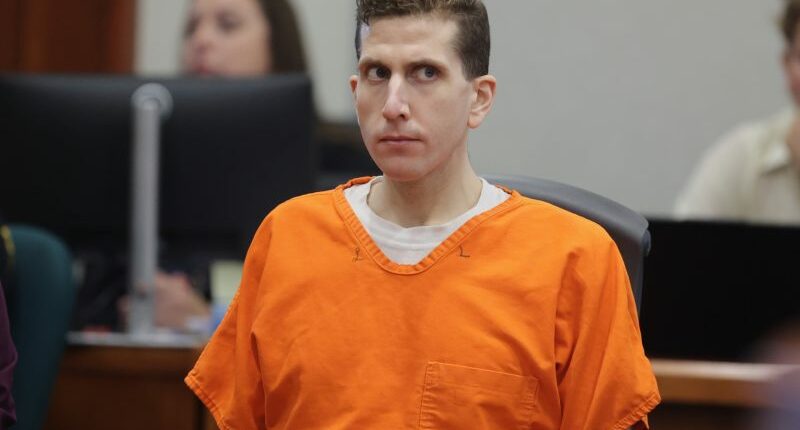Share this @internewscast.com
() Bryan Kohberger was sentenced to life in prison for the brutal murders of four Idaho college students, but he may still have a path to appeal despite waiving the right in his plea deal.
Under the deal Kohberger accepted, the death penalty was taken off the table in exchange for a guilty plea deal in which he also agreed to waive his appeals in the killings and burglary charges.
But that deal doesn’t quite shut the door, criminal law attorneys told .
“Theoretically, there’s some legal avenues that Kohberger could explore, but I think all of those will likely be futile,” said Eric Faddis, a trial attorney and former felony prosecutor.
Last wee, Kohberger was sentenced by Judge Steven Hippler, who handed down four life sentences, but also noted that an appeal was not impossible for the convicted killer.
Bryan Kohberger can file for post-conviction relief
Defendants still have the right to post-conviction relief even if they waive their right to appeal, Faddis said.
The grounds for the appeal would be issues such as ineffective assistance of counsel, a discovery violation, prosecutorial misconduct or that he was pressured or coerced into taking the deal, he said.
But Faddis noted that it would be highly challenging for these to stand up.
“It’s a high bar for an appellant to establish that their counsel was ineffective,” he said. “Kohberger would have to show that his lawyer’s performance was legally deficient and that those errors prejudiced him.”
But from the looks of it, it appears his defense attorneys left no stone unturned, he noted.
It will also be difficult to prove he was pressured into the deal because of how extensive the judge was in his questioning of Kohberger, Faddis said.
“Theoretically, he could argue that, but I watched the plea hearing, and the judge was very diligent and extensive in his advisement of Kohberger, establishing that the plea was knowing, intelligent and voluntary,” he said.
Faddis also noted that none of the post-conviction options would be a “get out of jail free card” and would instead kick the legal process back to square one.
“From a practical standpoint, even if he were to pursue the appeals, he could end up being worse off than he is right now, in the sense that the case would start over and the death penalty would be back on the table with substantial evidence of his guilt,” he said.
Supreme Court gave defendants right to appeal even under plea waivers
In a 2019 ruling under Garza v. Idaho, the U.S. Supreme Court protected a defendant’s constitutional right to appeal despite an appeal waiver.
The case, which was also brought up by Hippler at Kohberger’s hearing, was based on a defendant who asserted an ineffective counsel argument.
A door could technically open for Kohberger under this ruling, said Charles Crafts, an Idaho criminal defense attorney.
This is especially so because his plea agreement appears to be “thin,” he said.
Crafts said he was surprised to see that Kohberger’s plea deal was not the comprehensive, multi-page guilty plea advisory form offered by the Idaho Supreme Court.
“There’s a lot of things, quite frankly, that I’m surprised are not in that plea agreement,” Crafts said.
They should have guarded against every scenario that could have made it possible for Kohberger to pursue an appeal, Crafts said.
“If I was a prosecutor, I would have included in the plea agreement that, pursuant to Garza versus Idaho in the event that he does file an appeal … that is a breach of the plea agreement and the state will then be able to go back and seek the death penalty,” he said.
“But that language is not in there.”
Crafts noted that even if Kohberger moved forward with an appeal, it would be limited because he’s already pleaded guilty and admitted the killings.
Faddis agreed, saying that successful appeals come after a trial takes place where there was some error, but without a trial, any appeal would be narrow with less grounds to argue.
“I just don’t see any court ruling or attorney failure or governmental error that could possibly fail on that,” Faddis said.
Idaho trial judge noted a possible Kohberger appeal
Hippler has mentioned the possibility of an appeal a number of times after Kohberger accepted the plea deal.
During a hearing prior to sentencing, when he ruled on lifting a gag order on the case, Hippler told the court that sealed documents would remain untouched until after sentencing and “after the appeals period has run.”
He also noted that “the fact that a defendant waives a right to appeal doesn’t mean they don’t have a right to appeal.”
Hippler told Kohberger during his sentencing hearing that, by law, he has the right to file a notice of appeal within 42 days of the filing of the judgment.
This may not be the last we hear from Kohberger, Crafts said.
“He’s an intelligent guy and really, the end of it doesn’t come in 42 days, because if they don’t file the appeal, then he could come and file the post convictions,” Crafts said.




























